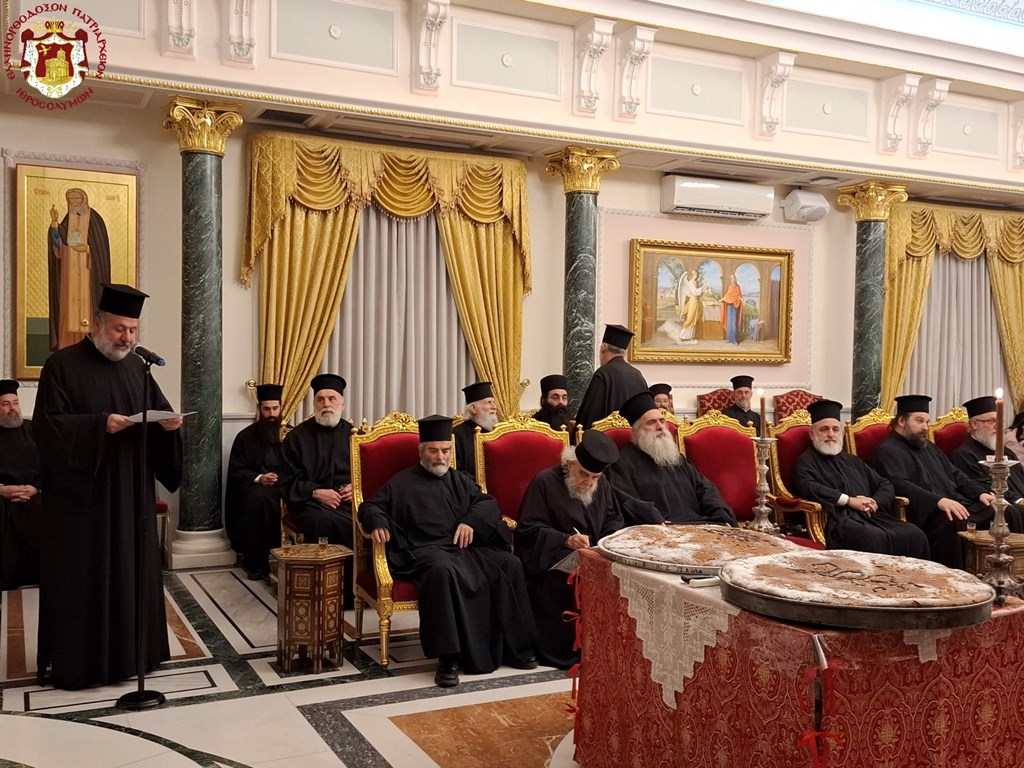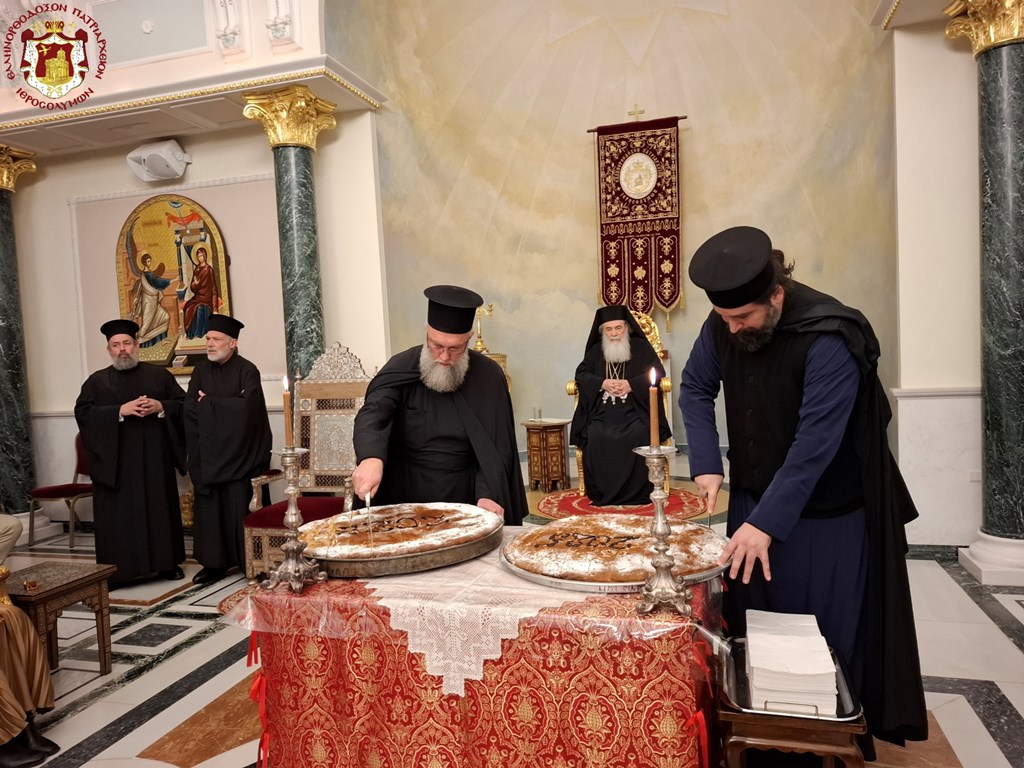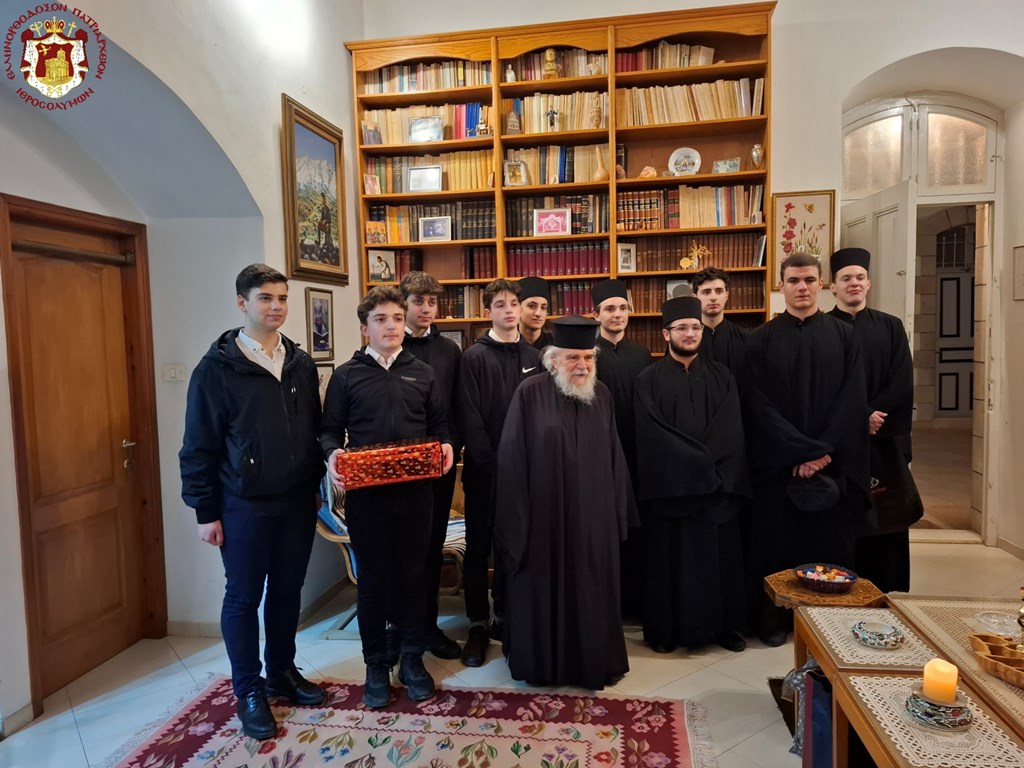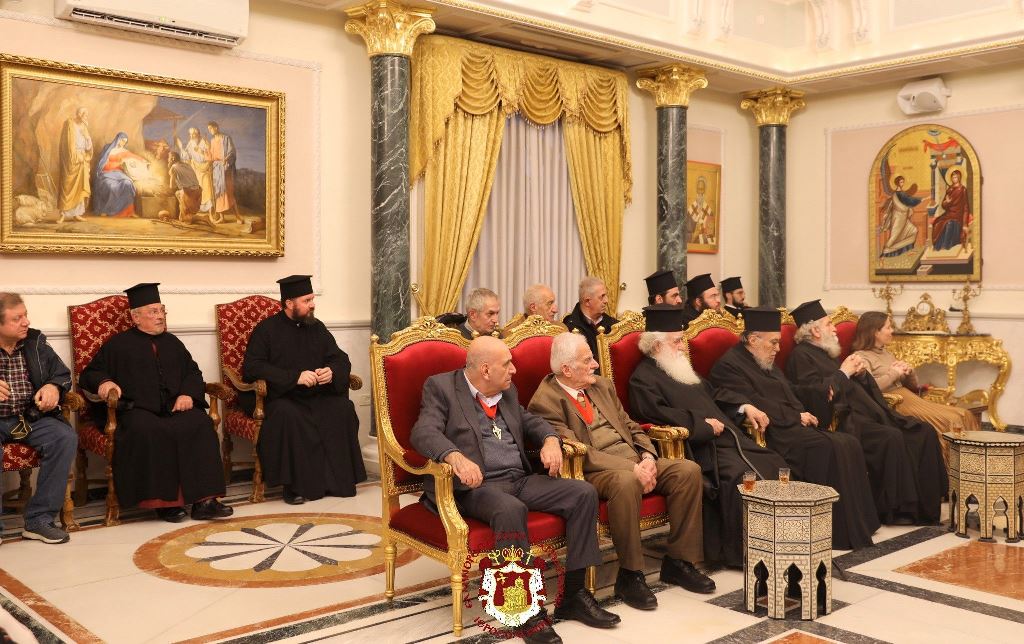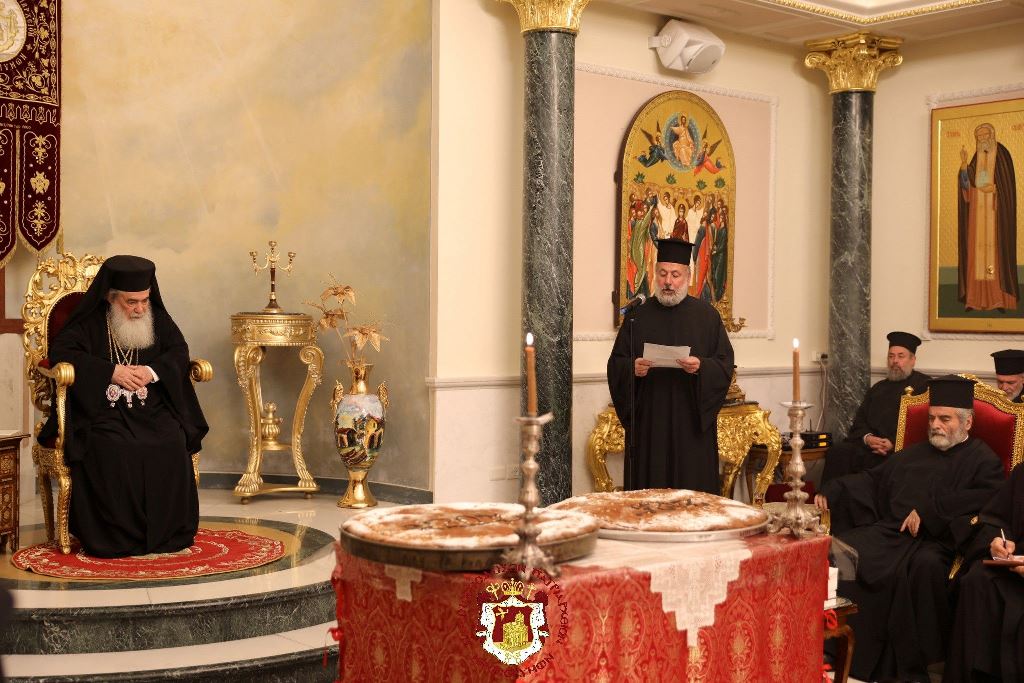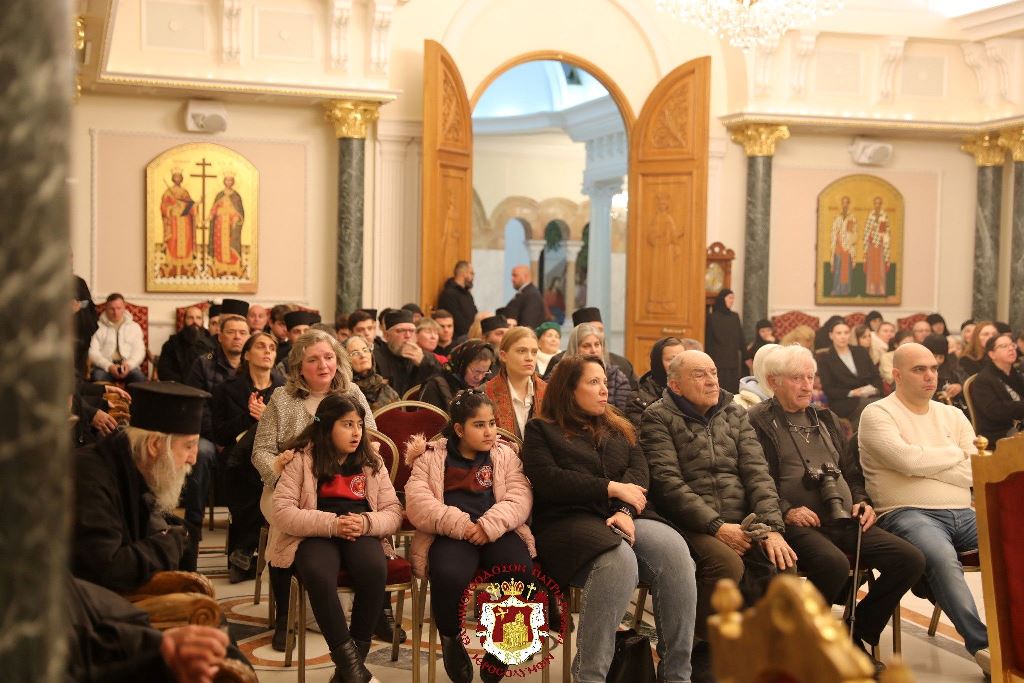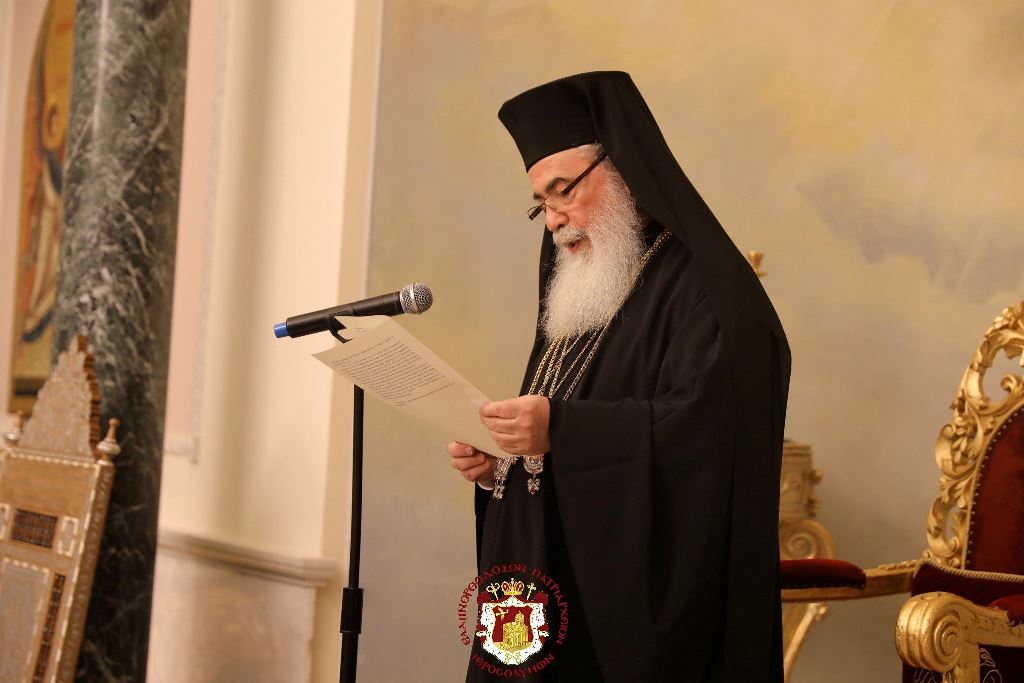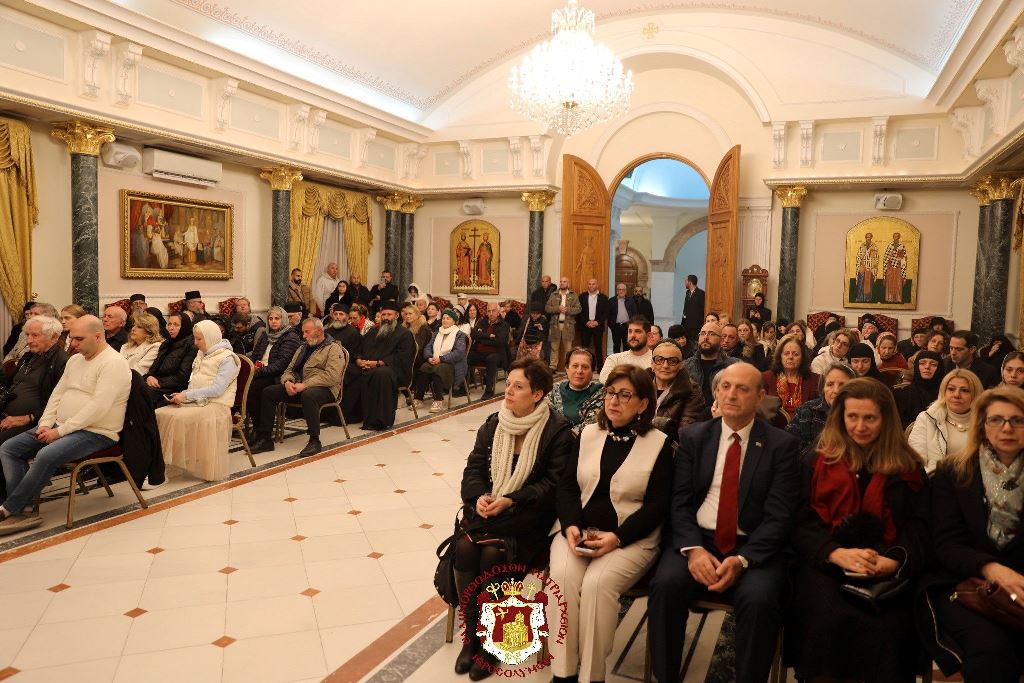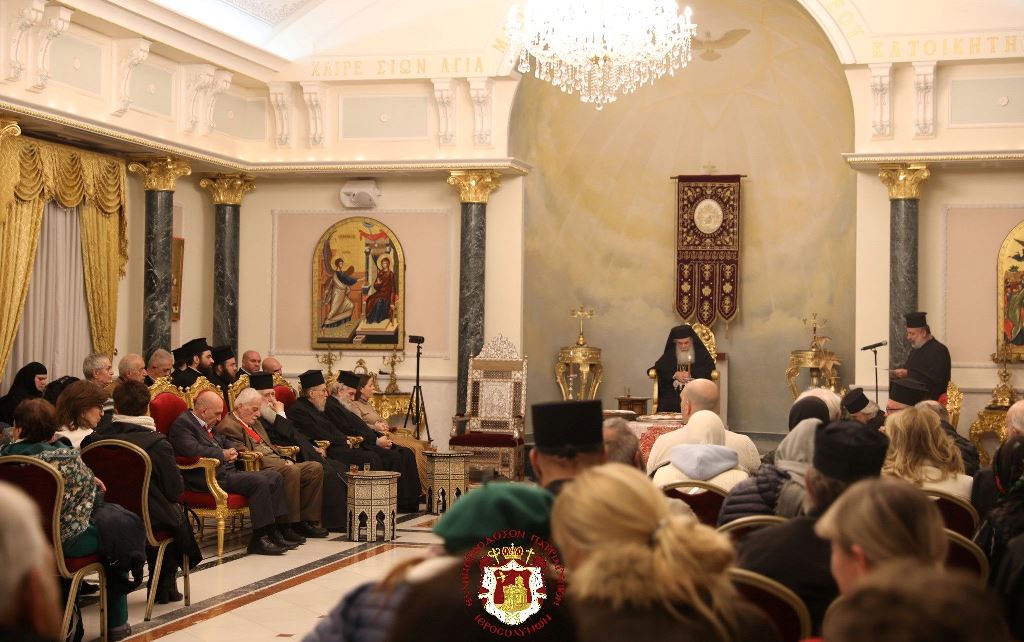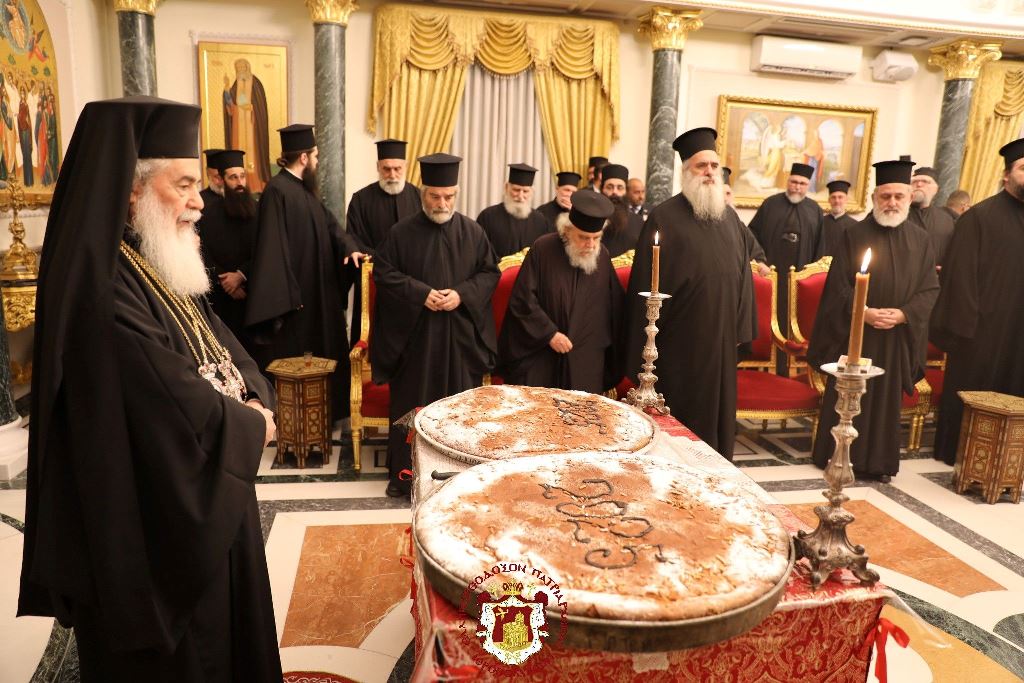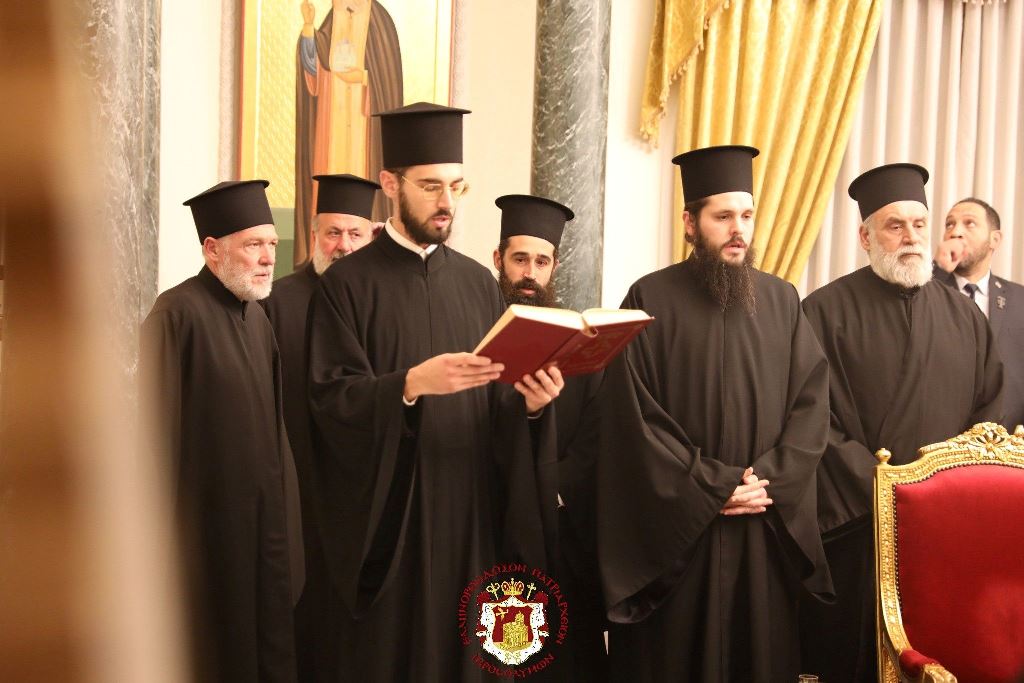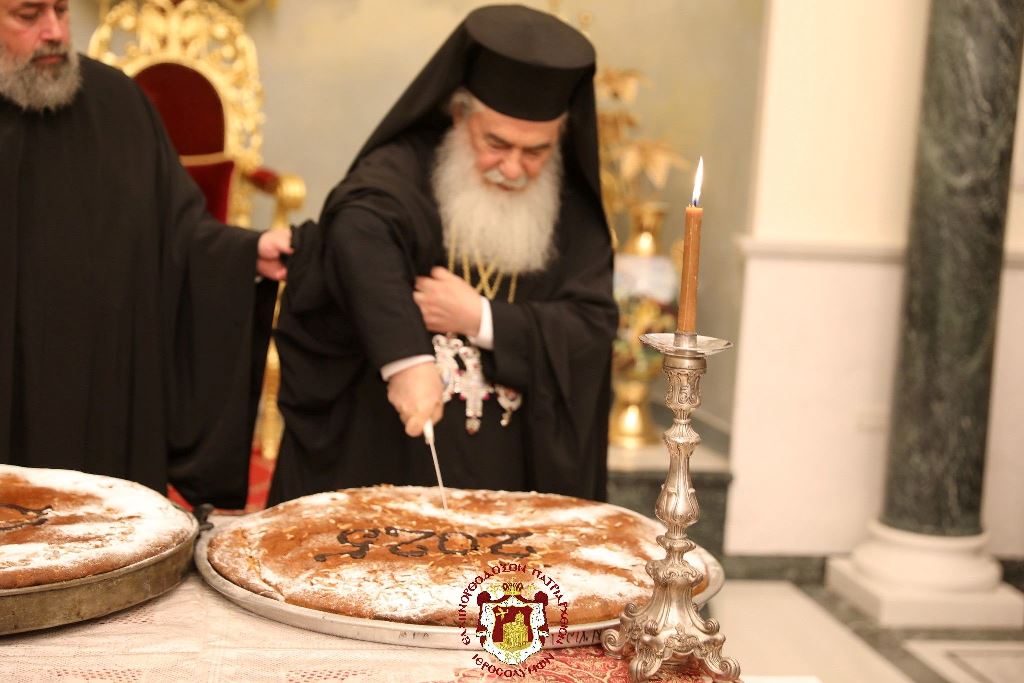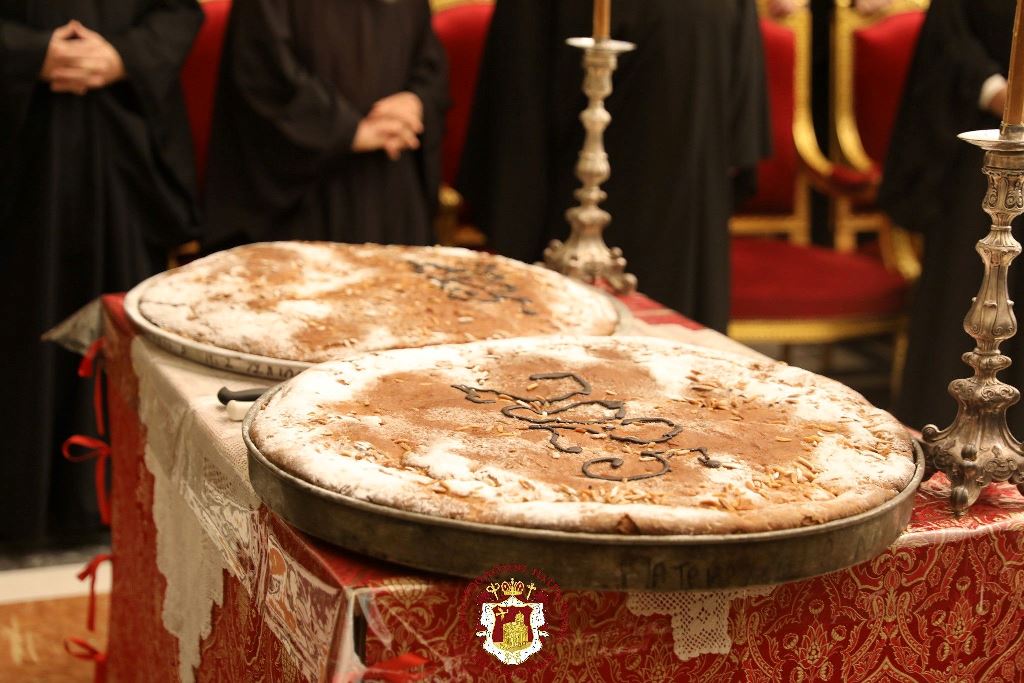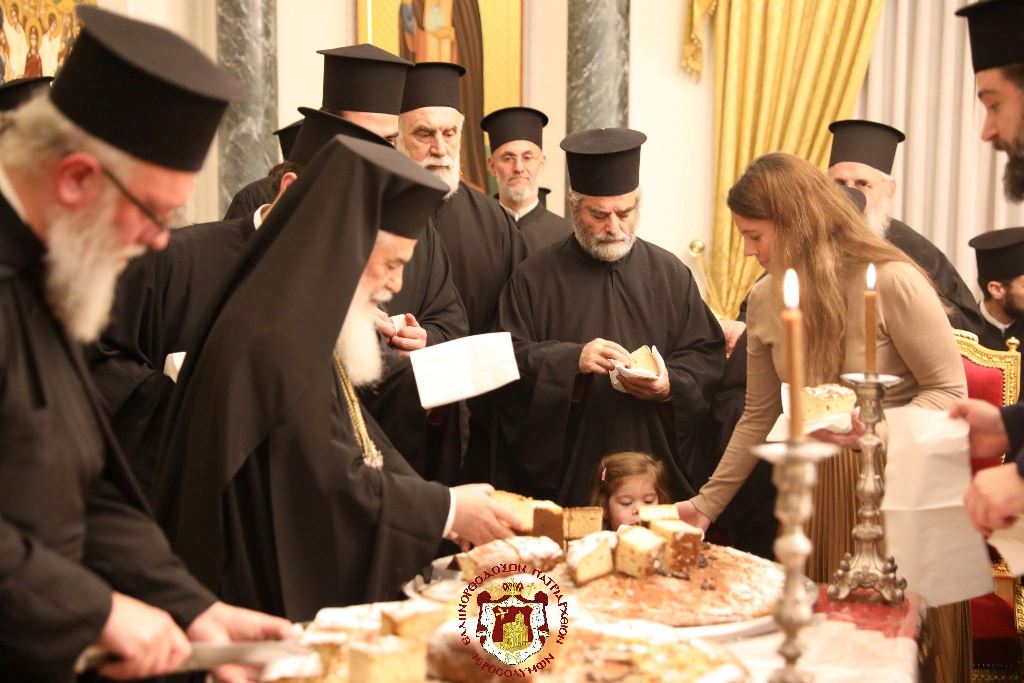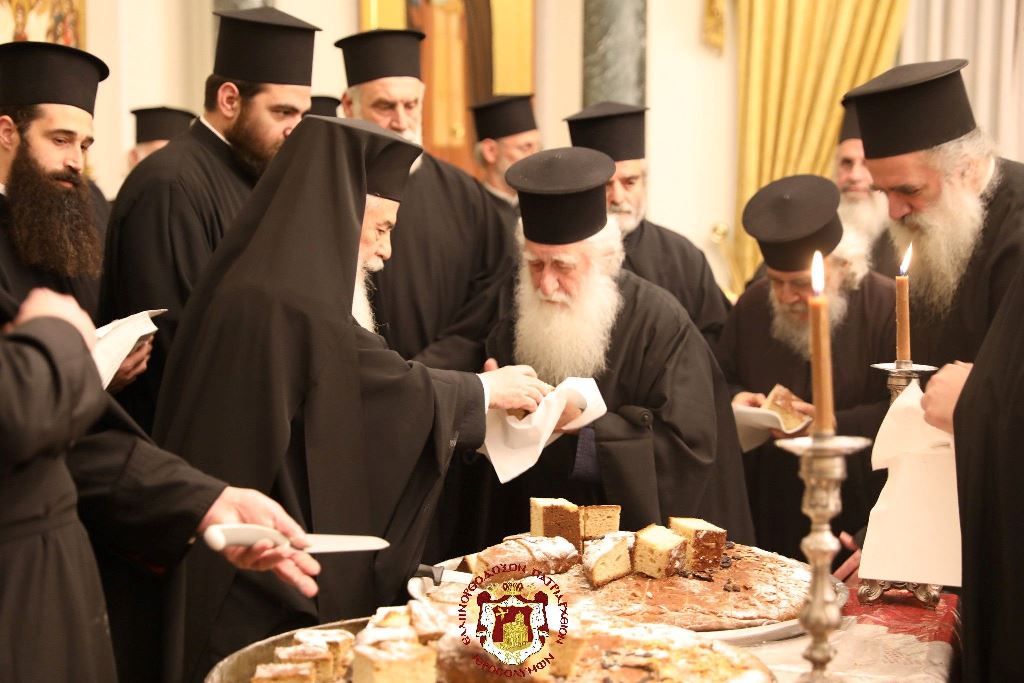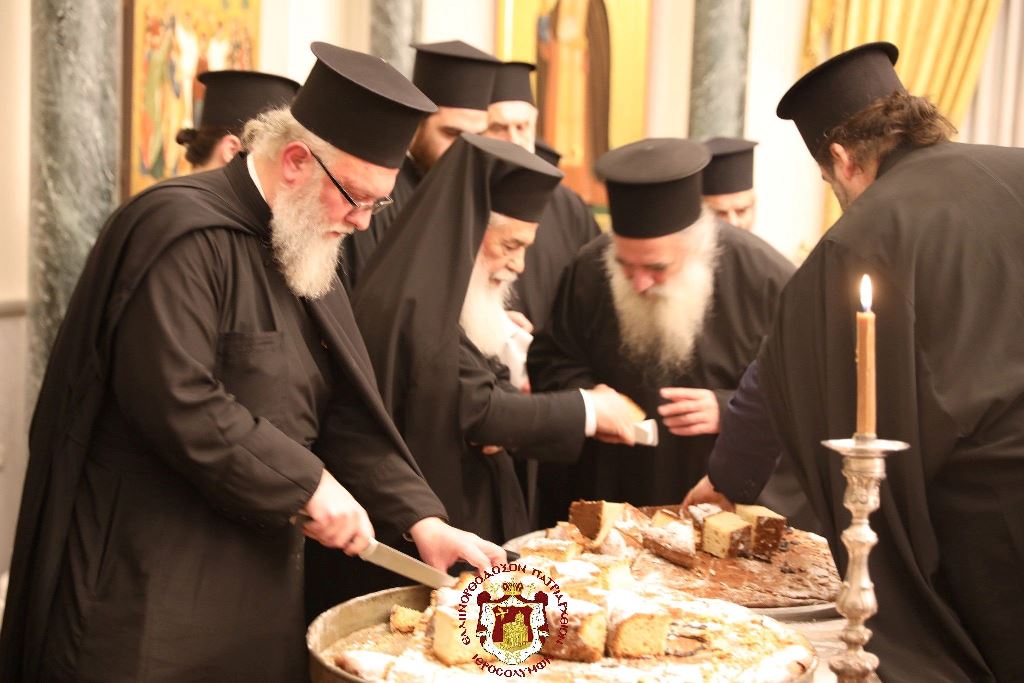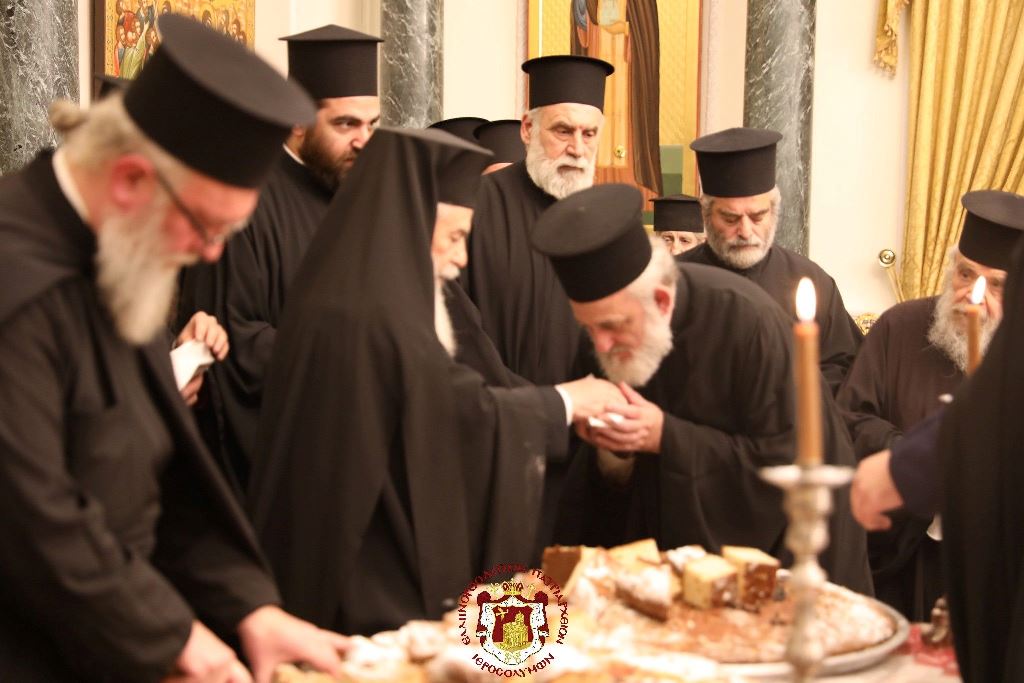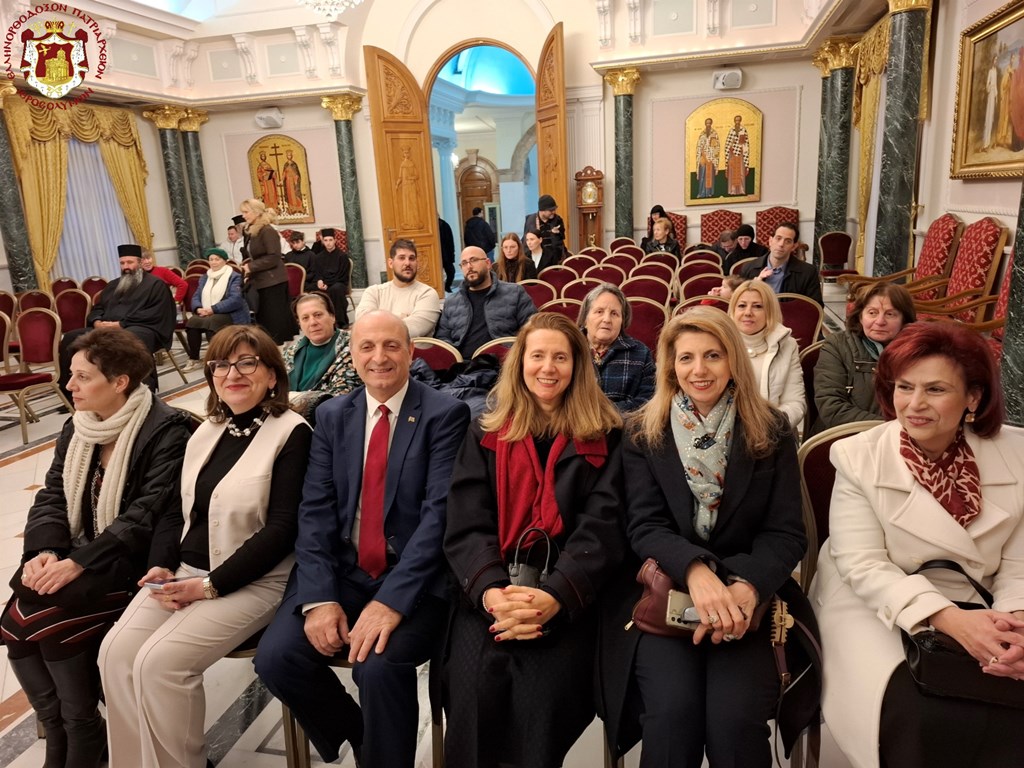Patriarchate of Jerusalem: The cutting of the Vasilopita
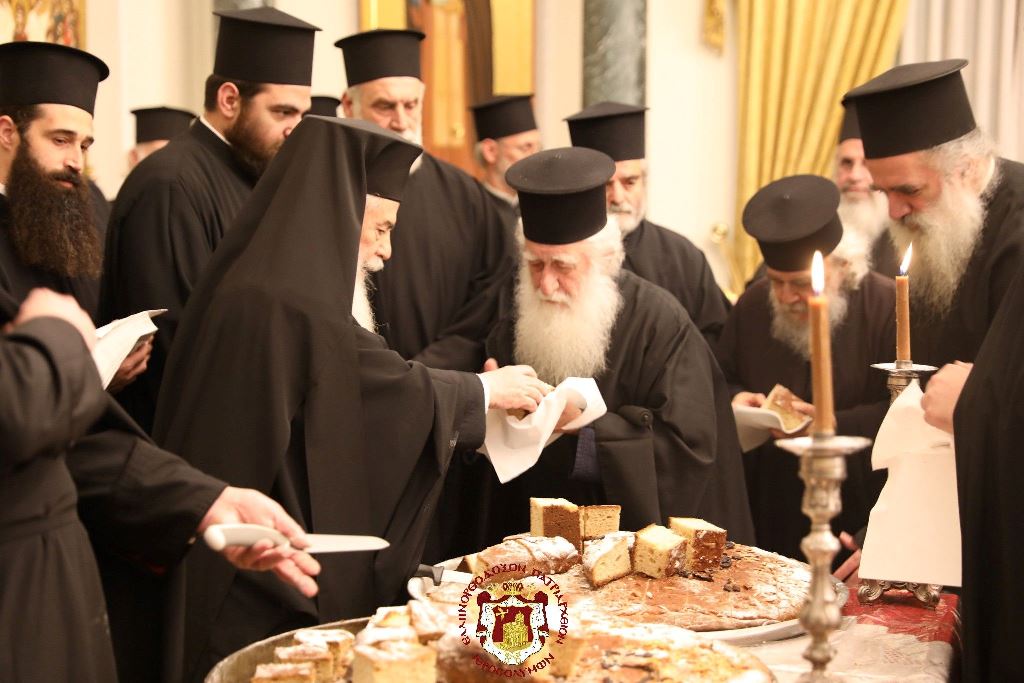
On the evening of the Eve of the Feast of St. Basil the Great and the New Year, 31st December 2024 / 13th January 2025, the cutting ceremony of the Vasilopita took place in the Patriarchal Hall of the Patriarchate.
Present at the ceremony were the representative of the Greek Consulate General in Jerusalem, Mrs Anna Mantika, and members of the Consulate, as well as Patriarchal Clergy, Bishops, Priests, Deacons, Monks, Nuns, and members of the Greek and Arabic-speaking communities of Jerusalem. His Beatitude addressed all the participants of this solemn event with the following words:
“For God hath given me to know the knowledge of the things that are, to know the constitution of the world, and the operation of the elements, the beginning and the end, and the middle of times, the changes of turns and alterations of seasons, the cycles of years, and the positions of the stars” (Wisdom of Solomon 7:17-18), the Wisdom of Solomon says.
Your Excellency Consul of Greece, Mrs Anna Mantika,
Reverend Holy Fathers and Brethren,
Beloved Brethren in Christ,
The Creator of all the creation, who has placed times and seasons under His own authority, the Lord our God, has gathered us all together in this sacred place of our ancient and venerable Patriarchate of Jerusalem, so that we may celebrate a double feast: the commemoration of our Holy Father Basil the Great, by the cutting of the cake bearing his name, the Vasilopita, and the entrance of the new year, which signifies the new manifestation of the Lord’s goodness.
The wisdom of God, as Solomon says, is that which can know the constitution of the world and its elements, especially the concept of time, which is distinguished into beginning, end, and middle. Time cannot be defined by the length of days, nor by quantity, as the Apostle Peter teaches us, recalling the psalmist’s words: “But, beloved, be not ignorant of this one thing, that one day is with the Lord as a thousand years, and a thousand years as one day” (2 Peter 3:8).
It is an indisputable fact that the determination of time in present, future, and past has occupied the minds of the wise of this world, but in vain, for time is created, that is, the work of the ineffable wisdom of God, who brought all things into being from non-being, as the hymnographer of the Church says: “The Creator, who out of nothing brought all things into being, wisely renewing them, and leading the revolutions of the times according to His will, let us praise and exalt Him unto the ages.”
The incarnation and becoming man of the Word of God, who took flesh from the pure blood of the Theotokos Mary, that is, our Lord Jesus Christ, is the sole authority over historical time and its fullness, as the Lord Himself proclaims, saying: “It is not for you to know the times or the seasons, which the Father hath put in His own power” (Acts 1:7). Explaining these words of the Lord, Saint Gregory of Nyssa says: “The Father hath placed the times in His own authority, and from the times, we understand that all things born within time are subject to the Father’s will.” Saint Athanasius the Great emphasises, saying: “Concerning the hour of the end of all things, as the Word knows it, so the man is ignorant of it; for it is the nature of man to be ignorant, especially of these matters.” And according to Saint Cyril of Alexandria: “It is not necessary to be curious about those things which are very secret and hidden in God, and through this the Lord was teaching us.”
Indeed, the determination of the concept of time and especially its change, is a secret work, hidden in God, the Creator of all things, as Saint Paul proclaims, saying: “For by Him were all things created, that are in heaven, and that are on earth, visible and invisible… he created all things, and for Him” (Colossians 1:16).
Therefore, in his “Homilies on the Hexaemeron” (Six Days), Saint Basil the Great says: “Thus, the world had to be introduced to the beings… therefore, the passage of time is inseparable from the world… Time is a flow that is always urgent, ever flowing, and never ceases on its course. Or is Time, not that which, the past has vanished, the future is not yet, and the present, before it can be fully perceived, escapes immediately from the grasp of the senses?” [In simpler terms: And when the time came for the world to be brought into being, the world was created as the foundation of the flow of time, inseparable from the world… a single flow which constantly urges on, flowing alongside it, and never terminates its course. Or is Time not something, of which the past has vanished, the future has not yet appeared, and the present, before it can be fully apprehended, escapes immediately from the grasp of the senses?].
According to Saint John of Damascus, “God, from non-being, brings forth and creates all things, both visible and invisible, and the man composed of both visible and invisible.” And according to Saint Paul, “God… hath in these last days spoken unto us by His Son, whom He hath appointed heir of all things, by whom also He made the worlds” (Hebrews 1:1-2).
Interpreting this words of Paul, Theodoretos of Cyrrhus says: “For the age is not some essence, but an unsubstantiated thing accompanying those beings which have a created nature… The age is the space, which is joined with the created nature. The Son is called the Creator of the ages, teaching and educating us that He has always been transcendent to any temporal span.” Thus, the Old Testament speaks of the Father as “the One who existed before the ages,” as opposed to “the One who always is” (Proverbs 8:23).
In simpler terms: “The age is not an essence but an unsubstantiated thing that accompanies beings with a created nature… The age is the span, which is linked to created nature. The Scripture calls the Son the Creator of the ages. He is eternal, teaching us that He has always been transcendent over all temporal spans.”
Saint John of Damascus further emphasises: “The age was not measurable, but is the movement and span of time, which is continually in motion alongside the eternal. And in this sense, it is one age, as God is said to be eternal… By calling God ‘God,’ it is evident that I speak of the Father, His only-begotten Son, our Lord Jesus Christ, and His Holy Spirit, the One God of us.”
The historical human Time gains new significance with the incarnation of the Word of God, “who hath made known unto us the mystery of His will, according to His good pleasure which He hath purposed in Himself, that in the dispensation of the fullness of times, He might gather together in one all things in Christ” (Ephesians 1:9-10). Interpreting this Pauline word, the sacred Chrysostom says: “The fullness of the times was His (Christ’s) presence,” while Theophylactos says: “For the dispensation, governance, and condition,” that is, for the arrangement and organisation of His household (of Christ), which is the Church. This means that the Church, being the body of Christ, which is not of this world (John 8:23) but exists and acts in historical time, spiritually celebrates the change of time, that is, in the spirit of the mystery of the divine Economy, as Scripture says: “In an acceptable time have I heard thee, and in the day of salvation have I helped thee; behold, now is the accepted time; behold, now is the day of salvation” (2 Corinthians 6:2 / Isaiah 49:8).
The only way, therefore, to understand Time is through the power and illumination of the knowledge of the mystery of the Gospel of Christ, according to which (the Gospel) His Time is understood as the passage “from this present world” into “the world to come,” the new creation, according to Paul. “Therefore, if anyone is in Christ, he is a new creation; the old has passed away; behold, all things have become new” (2 Corinthians 5:17). This new time, which is inseparable from Christ, is understood according to our participation in the mystery of the mystical Blessing, namely the divine Eucharist, in which Christ dwells in our hearts (cf. Ephesians 3:17), and time becomes kairos (the opportune moment).
The present time of the change of Time, where “the mystery of lawlessness is already at work” (2 Thessalonians 2:7), and “everyone who practices sin also practices lawlessness; and sin is lawlessness” (1 John 4), on the one hand; and on the other, the entire human race is tested by wars, earthquakes, plagues, floods, and an unquenchable fire. We are called to come to ourselves, hearing the exhortation of Saint Paul, who says: “See then that you walk circumspectly, not as fools, but as wise, redeeming the time, because the days are evil” (Ephesians 5:15-16), “and praying always with all prayer and supplication in the Spirit” (Ephesians 6:18).
Therefore, as we celebrate in Christ the God the Word and our Saviour, the dawn of the New Year of the Lord’s kindness, let us implore the holy Bishop of Cappadocia, Basil the Great, to intercede with the Lord, who was circumcised in the flesh, for peace in the whole world, especially for the suffering Gaza and the broader region of the Middle East. Let us also pray for the cessation of divisions, “that there be no schism in the body” (1 Corinthians 12:25) of the One Holy Catholic and Apostolic Orthodox Church.
After the hymnographer, let us say: “O Creator of all creation, who has appointed the times and seasons in His own authority, bless the crown of the year of Your goodness, O Lord, preserving in peace and unity Your Church, our venerable Brotherhood of the Holy Sepulchre, our devout Christian flock, the Holy City of Jerusalem, and the devout nation and race of the Rum-Orthodox, through the intercessions of the Theotokos, and save us.” Amen.
Blessed, fruitful, and filled with goodness and peace on earth be the New Year 2025!”
Following this, the Troparia for the Circumcision of Christ were sung: “Thou hast taken upon Thyself the unchanging form of a human being…” and for St. Basil the Great: “Thy voice has gone forth unto all the earth…” His Beatitude wished for a prosperous, peaceful, and blessed New Year, then cut the Vasilopita and distributed it to all present.
Once the Vasilopita had been distributed, the students of the Patriarchal School sang traditional carols from all over Greece and the New Year carols of the Holy Sepulchre: “We, the new generation of the Holy Sepulchre…” and “New Year, New Beginning…” Then, following tradition, they went to the residences of the Patriarchal Fathers to sing the carols.
From the General-Secretariat
Source: Patriarchate of Jerusalem
